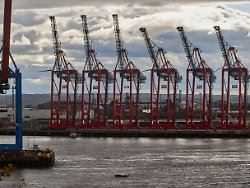According to new calculations by the so-called economic practices, the German economy is not collapsing as much as assumed, but for the experts the crisis has not yet been overcome. According to economists, the most important thing now is whether the second wave can be broken.
In view of the persistently critical Corona situation, the "economic wise men" have warned of setbacks for the economy in Germany. The Council of Economic Experts raised its forecast for economic growth this year. Due to the rapidly increasing number of infections, the economic situation remains fragile, said the chairman of the "Wirtschaftsweise", Lars Feld, when presenting the annual report. For further development it is crucial how the pandemic can be contained and how the economy abroad develops.
The Expert Council handed over the report to Chancellor Angela Merkel. In it, the economists call on the federal government to carry out structural reforms. Deficits in digitization, in health and education as well as in public administration must be rapidly reduced. Due to a strong economic recovery in the third quarter, the "economic wise men" are now anticipating a decline in gross domestic product (GDP) of 5.1 percent for the current year. That would be roughly at the level of the slump in the global financial crisis in 2009. In June, the Council had forecast a minus of 6.5 percent for 2020.
Scholz: Aid policy has prevented a downward spiral
The "economic wise men" are currently somewhat more optimistic than Minister of Economic Affairs Peter Altmaier. Finance Minister Olaf Scholz sees the Federal Government's course confirmed by the report. "The 'economic wise men' 'prove us right: the resolute aid policy is paying off," said the Vice Chancellor. With the massive aid, the federal government managed to prevent a serious downward spiral. According to the experts, the forecast takes into account the recent increase in the number of infections and the tightened corona restrictions in November. The federal and state governments had decided to take tough measures to prevent the virus from spreading further quickly. Gastronomy businesses had to close for November – only pick-up or delivery are allowed. Hotels are no longer allowed to accept tourists, and leisure and cultural facilities are not allowed to open at all. The federal government has decided in aid of billions.
In the prognosis, the Advisory Council assumes that the number of new infections can be kept under control with limited intervention, that no extensive shutdown is necessary as in spring 2020 and that the international supply chains will not be significantly disrupted. In the coming year, the "economic wise men" expect growth of 3.7 percent. However, this is also subject to a reservation: "If there are massive restrictions in economic activities similar to those in spring, a more pronounced decline in economic output can be expected." GDP in the coming year could be a lot lower than previously expected.
Crisis could also be an opportunity
The widespread shutdown and interrupted supply chains in the spring had caused the economy to collapse. From July to September, however, the gross domestic product rose unexpectedly strongly, namely by 8.2 percent compared to the previous quarter. The German Council of Economic Experts also expects that the pre-crisis level will not be reached again until the beginning of 2022 at the earliest. But the crisis could also be an opportunity, the "economic wise men" made clear – namely that companies are driving digital change and increasing their efforts to protect the climate. For this, however, clear framework conditions are necessary, says Feld.
One possibility is an energy price reform, which abolishes the EEG surcharge to promote green electricity and reduces the electricity tax to the European minimum. A reform of the Renewable Energy Sources Act is being discussed intensively in politics in view of the high electricity prices for households and companies. The five-person council of experts for assessing macroeconomic development advises politics. The experts are colloquially referred to as the "economic modes".
. (tagsToTranslate) Economy (t) Corona crisis (t) Economy (t) Germany (t) Economic growth
